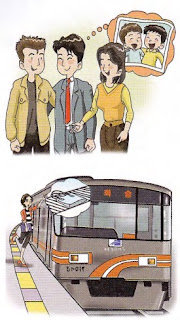 가: 둘이 아는 사이였어요?
가: 둘이 아는 사이였어요?
Do you two know each other?
나: 네, 처음에는 누군지 몰랐는데 만나고 보니 초등학교 동창이 었어요.
Yeah, at first, I didn’t know who it was, but after meeting, we discovered we were schoolmates in elementary school.
가: 웨이밍 씨, 오늘 가방 안 가지고 왔어요?
Wei Ming, didn’t you bring your bag today?
나: 지하철에 놓고 내렸어요. 지하철에서 내리고 보니 가방이 없더라고요.
I left it on the subway. I got off the subway and found that I didn’t have my bag with me.
This expression is used to indicate that the speaker learned something new, discovered some new piece of information, or found out something was contrary to what was previously thought after some action or event occurred. The form -고 보니까 can also be used for -고 보니.
 • 세일을 한다고 해서 옷을 샀어요. 그런데 옷을 사고 보니 작년 상품이 었어요.
• 세일을 한다고 해서 옷을 샀어요. 그런데 옷을 사고 보니 작년 상품이 었어요.
I bought some clothes because they (said they) were having a sale. But once I bought them, I discovered they were last year’s merchandise.
• 비슷하게 생겨서 제 신발인 줄 알고 신었어요. 그런데 신고 보니 동생의 신발이었어요.
I put the shoes on because they looked just like mine. But when I did, I discovered that they were my little sister’s shoes.
• 버스를 타고 보니까 반대 방향으로 가는 것이 었어요.
I got on the bus to find that it was going in the opposite direction.
Only verbs can come before -고 보니. If an adjective or noun + 이다 precedes -고 보니, then the sentence is grammatically incorrect.
• 돈이 없을 때는 몰랐는데 돈이 많고 보니 더 외롭다는 생각이 들었어요. (X)
->돈이 없을 때는 몰랐는데 돈이 많아지고 보니 더 외롭다는 생각이 들었어요. (〇)
Because 많다 is an adjective, it must first be changed into a verb by adding -아/어지다 before it can be used with -고 보니.
• 배우가 되기 전에는 배우들의 생활이 부러웠어요.
그런데 배우이고 보니 배우들의 삶이 생각만큼 좋지 않다는 것을 알게 되었어요. (X)
->그런데 배우가 되고 보니 배우들의 삶이 생각만큼 좋지 않다는 것을 알게 되었어요. (O)
Because 배우이다 is not a verb, it must first be changed into the form 배우가 되다 before it can be used here.
>> You can click on the title of each grammar below to learn about the other grammar which also expresses ‘Discoveries and Results’:
01 -고 보니
02 -다 보니
03 -다 보면
04 -더니
05 -았/었더니
06 -다가는
07 -(으)ㄴ/는 셈이다
>> Full of Intermediate grammar: Click here
